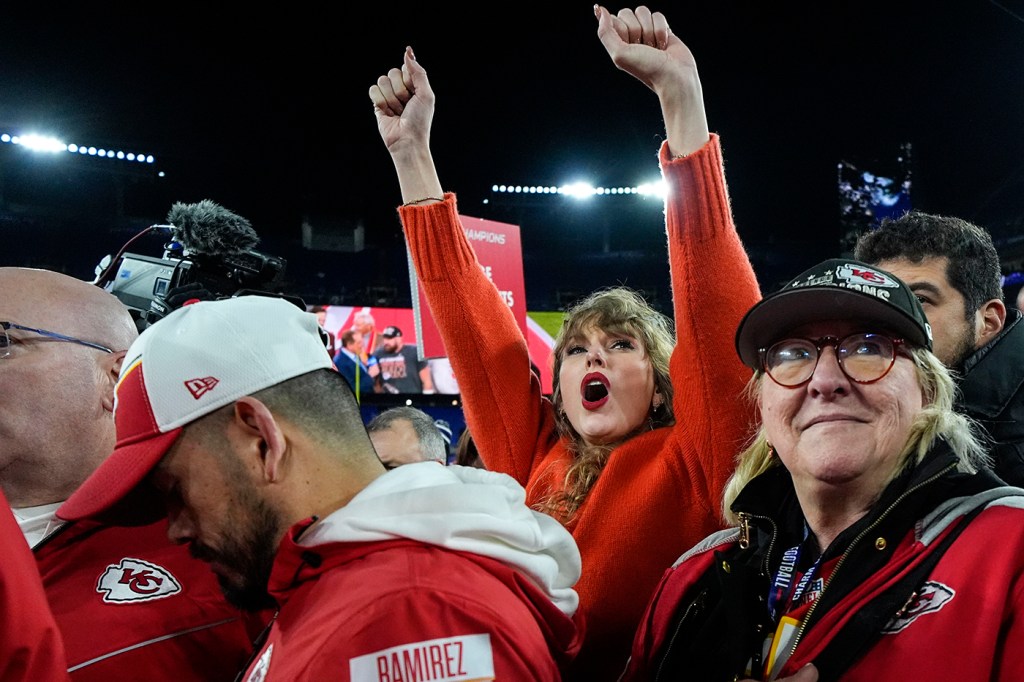Will the phenomenon of Swiftonomics bring extra Super Bowl 2024 revenues?
Anything Taylor Swift touches leads to a consumption boost, Northeastern expert says.

Two huge phenomena — the Super Bowl and Taylor Swift — will collide on Sunday, Feb. 11, and the economic reverberations could be felt from ticket prices to social media content.
Swift, a mega-popular American singer-songwriter, is expected to be present at the biggest sporting event of the year. After all, she’s reportedly attended 12 out of 20 football games played by the Kansas City Chiefs to watch her new-ish boyfriend Travis Kelce play tight end.
The Chiefs will meet the San Francisco 49ers in Las Vegas for the NFL’s championship game.
The pop star sure has the Midas touch. Her latest tour has pushed her net worth over $1 billion, according to Bloomberg News. And her brand value has reportedly boosted the worth of her boyfriend’s football team by $331 million, according to Apex Marketing Group.
And that was before she announced a new album during the Grammys on Sunday night. “The Tortured Poets Department” will debut April 19.
“Anything Taylor Swift touches leads to a consumption boost,” says Yakov Bart, associate professor of marketing and Thomas E. Moore faculty fellow at Northeastern University.
Will Swift’s star power boost revenues even further with her appearance at Super Bowl 58, also known as “Swiftie Eight,” just like “Swiftonomics” has been affecting the U.S. economy?
Swift could drive up ticket prices on the secondary market, local hotel costs, and food and merchandise sales, experts say, but initial tickets are already sold. On the secondary market, the cheapest ticket, situated in the back of the upper section of the arena, is selling for $6,124 as of Wednesday afternoon. The lowest priced ticket at face value — before hitting the secondary market — was reportedly $700.
Broadcasting, streaming rights already sold
The lion’s share of the NFL’s revenues comes from selling broadcasting and streaming rights, but they’ve also been distributed. This year the Super Bowl will air on CBS and will be streamed live on such platforms as Paramount +, Hulu + Live TV, and FuboTV.
In 2023, the cost of an average 30-second ad spot during the Super Bowl broadcast was an estimated $7 million. In 2022, it was $6.5 million, and the year before $5.5 million.
Despite Swift’s fans significantly adding eyeballs on the event, the broadcasting networks won’t be able to capitalize much on the singer’s presence, says Alexander DePaoli, associate teaching professor of marketing at Northeastern.
That’s because Super Bowl ads are booked well in advance.
However, DePaoli says he wouldn’t be surprised if the viewers end up seeing an ad that has Taylor Swift in it during the Super Bowl, but the window where the broadcasters could reasonably charge more for that has passed.
“There’s just not that many opportunities for people within the NFL or affiliated directly with the NFL to extract that much more value out of Taylor Swift’s fans, except potentially in merchandising, which again has to kind of be indirect without her consent and signoffs,” DePaoli says.
Potentially the broadcasting network could take on additional sponsorships that it could display whenever Swift is on the screen, he says, but that would be rather unusual.
Who still can make the money off of Swift?
Ticket resellers will definitely try to take advantage of this opportunity, Bart says, as well as any hotels or Airbnb hosts who still have any rooms or apartments left available at this time. Swift’s fans have been known to flock to the cities she is performing in even if they can’t get a ticket to her concerts.
There are usually a lot of people, DePaoli says, selling sports paraphernalia outside the arena that are manufactured either by some third party or bootlegged.
“People who don’t really need to worry about licensing or partnering with her because they’re just sort of street-level sellers,” he says.
Some brands might try to get additional social media engagement and tie themselves creatively to Swift, Bart says, similar to American Airlines and United, which both changed the number of their flights between Kansas City and Las Vegas to 1989 after the title of one of the singer’s albums.
“She doesn’t own the number,” Bart says, which means the airlines don’t have to pay Swift for this marketing trick.
How can one celebrity make such an impact?
One of the compelling explanations to why a celebrity can have such an impact, says DePaoli, is the idea of parasocial relationships. In the digital era, fans of celebrities and social media influencers feel like they have access to “a window into their locker” either through the celebrity’s social media accounts or interviews.
“It develops this sort of phantom sense of social connection,” DePaoli says. “You start to perceive someone as being, for lack of a better word, a friend, when in fact, of course, you don’t actually have any relationship with this person.”
This especially pertains to teenagers who are still figuring out how to express their own identity and do that through celebrities they admire. When so many people feel so strongly about a famous person such as Swift, DePaoli says, it creates an amplifying effect, or a “halo effect,” when fans feel incredible positivity toward their idol.
Swift’s fans might hold parties, thus affecting overall consumer spending around the Super Bowl when they buy food, merchandise and decorations. But DePaoli is skeptical that they will have much of an opportunity to affect Super Bowl revenues through anything else besides buying Kelce’s jerseys.
Featured Posts
Is Taylor Swift being taken advantage of?
As one of the most prominent celebrities and, therefore, brands on the planet, DePaoli says, Swift probably has a team of lawyers making sure no one is trying to leverage her image in a way that she does not get a cut.
She also reportedly advocated for herself at the M&T Bank Stadium in Baltimore recently when the Chiefs defeated the Baltimore Ravens to win the AFC Championship, mouthing to the NFL camera operators to leave her alone.
“She would rather have a little bit more control over how her image is being monetized in relation to the NFL,” DePaoli says. “But there are absolutely limits to both what is reasonable and ultimately what legal right you have to control the use of your image as a public figure.”
The NFL won’t be able to benefit from the larger number of viewers even after 2024, because it signed $113 billion in broadcasting deals with TV networks that run through the 2033 season.
However, the broadcasters can raise prices for the ads for next year’s Super Bowl as these fees are also based on the expected number of viewers.
“It will be interesting to see,” Bart says, “if the increased number of viewers will further push up prices for the next year.”











